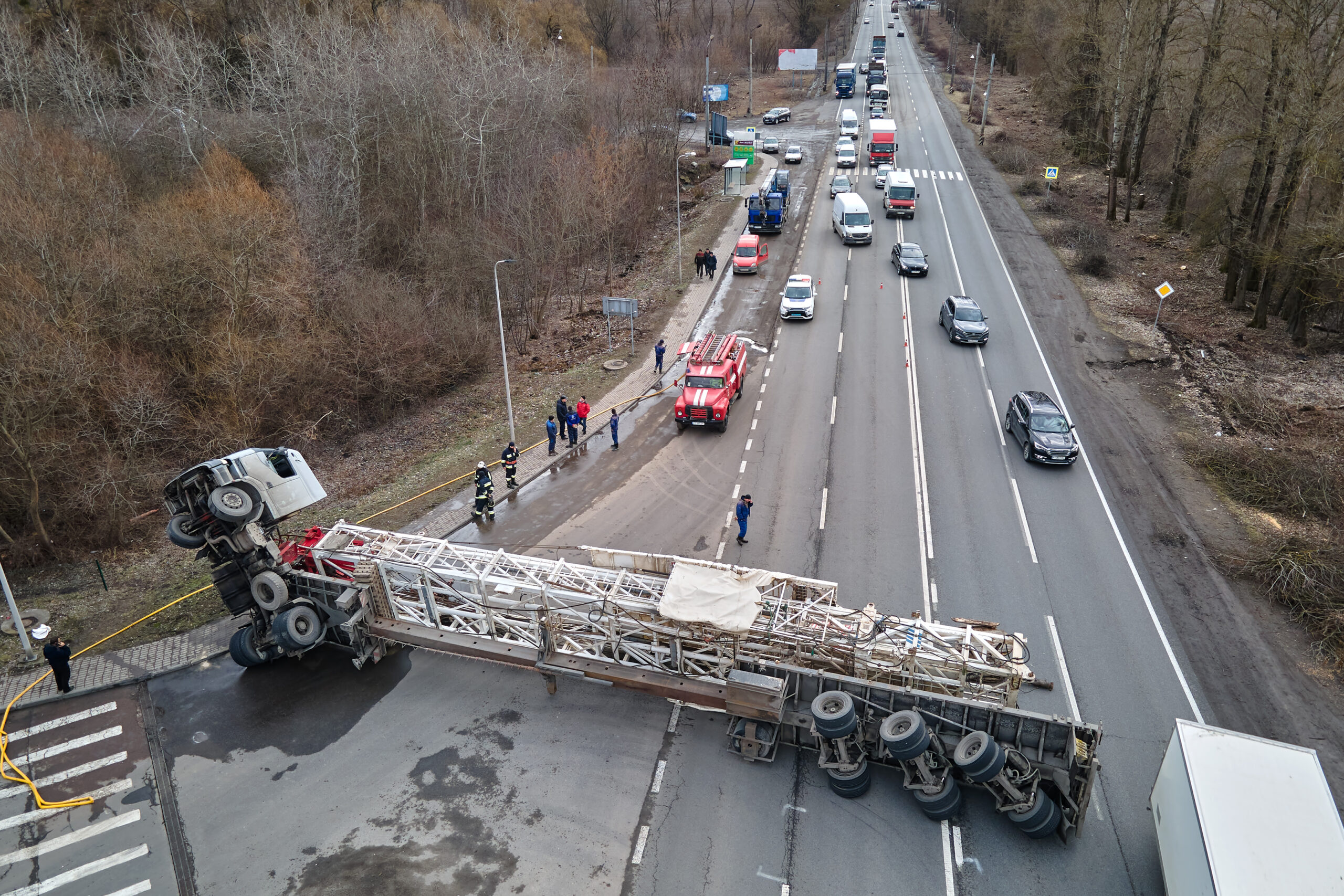Causes of Truck Accidents in Pennsylvania
In Pennsylvania, the common causes of truck accidents are multifaceted, reflecting a range of operational and environmental factors. From driver error, including fatigue and distraction, to mechanical problems or even weather conditions, there are many different ways crashes involving large truck drivers and passenger car drivers can occur.
Due to commercial trucks’ sheer size and weight, accidents involving these vehicles often lead to serious injuries or fatalities. The disparity in size between a commercial truck and a passenger vehicle means that even low-speed collisions can result in significant harm. Victims may suffer from a wide range of injuries, including, but not limited to, traumatic brain injuries, spinal cord injuries, broken bones, and internal bleeding. The recovery process can be long and challenging, sometimes requiring extensive medical treatment and rehabilitation. If you or a loved one has been injured or killed in a Pennsylvania truck accident, contact the truck accident attorneys at PhillyLaw for a free consultation.

Many Truck Accidents are Due to Driver Fatigue
One of Pennsylvania’s most common causes of truck accidents is driver fatigue. Due to long hours on the road and the pressure to meet tight delivery schedules, truck drivers often push themselves beyond safe limits, leading to decreased reaction times and impaired judgment.
Poor Vehicle Maintenance By Trucking Companies
Another significant factor is poor vehicle maintenance. Commercial trucks that aren’t regularly serviced or inspected can experience critical mechanical failures, such as brake failure or tire blowouts, increasing the risk of motor vehicle crashes.
Poor Weather Conditions Can Lead to Truck Accidents
Additionally, adverse weather conditions, notably in the winter months when roads are slick with ice and snow, contribute to a higher incidence of commercial truck accidents in the state.
Distracted Driving
Distracted driving is a particularly insidious cause of truck accidents due to the multiple forms of distractions that can affect a driver. When a truck driver’s attention is diverted from the road, even for a few seconds, the risk of an accident increases significantly. Distracted driving can be due to texting, using a navigation system, eating, or changing the radio station. Given the size and momentum of a commercial truck, a momentary distraction for a truck driver can prevent the driver from reacting in time to avoid a sudden obstacle or change in traffic flow, leading to potentially catastrophic accidents.

Aggressive Driving
Aggressive driving, characterized by speeding, tailgating, and erratic lane changes, significantly increases the likelihood of truck accidents. These actions reduce the driver’s ability to react to road hazards, maintain vehicle control, and safely maneuver in emergencies. Aggressive driving can be especially perilous for large trucks, which require longer distances to stop and are more challenging to control, leading to devastating consequences for both the truck driver and others on the road.
Impaired Drivers
Driving under the influence of alcohol, drugs, or even certain prescription medications can severely impair a truck driver’s abilities, making it one of the critical causes of truck accidents. Impairment can lead to delayed reaction times, impaired judgment, reduced coordination, and even loss of consciousness. Operating a commercial vehicle requires precise control and attention to detail; when these faculties are compromised, the risk of causing a severe accident increases exponentially. Furthermore, commercial truck drivers are held to stricter regulations regarding impairment, making any level of intoxication not only more dangerous but also illegal, heightening the legal and safety implications of such incidents.
Speeding
Speeding is prevalent in truck accidents, often leading to catastrophic outcomes. When truck drivers exceed the speed limit, their ability to react to sudden changes in traffic conditions or unexpected road hazards significantly decreases. Since trucks require a greater stopping distance than passenger vehicles, speeding exacerbates this issue, making it difficult to stop or slow down in time to prevent a collision. High speeds also affect the truck’s stability and maneuverability, increasing the risk of rollovers, especially during turns or when navigating curves. Consequently, speeding endangers truck drivers and other road users, making it a critical concern in improving road safety.
Impact of Truck Driver Experience on Truck Accident Rates
Experienced drivers are less likely to be involved in truck accidents owing to their comprehensive understanding of vehicle handling, road navigation, and hazard identification. Their time behind the wheel has not only sharpened their skills but also heightened their awareness of how to maintain safety in varying road conditions and traffic situations. Furthermore, seasoned drivers are more adept at anticipating potential risks and making split-second decisions to avoid accidents. Inexperienced drivers, who may not be fully familiar with the vehicle’s operations or the nuances of navigating Pennsylvania’s diverse roadways, can inadvertently cause accidents due to overcompensation, misjudgment of truck capabilities, or inadequate response to road conditions.
Poor Cargo Loading
Poor cargo loading is another critical factor contributing to truck accidents. Improperly secured or imbalanced loads can shift during transit, causing the truck to become unstable and difficult to control. This instability is especially dangerous on curves, during sudden stops, or when maneuvering. Overloaded trucks also put extra strain on the vehicle’s braking system, making it harder to stop and increasing the risk of jackknife accidents. Furthermore, loose cargo can fall onto the roadway, creating hazardous conditions for other drivers. Proper training in cargo loading and adherence to weight regulations are essential to preventing these types of accidents.
Cargo Shift
A cargo shift, occurring when the load being transported moves or is inadequately secured, poses a significant hazard in trucking accidents. Such shifts can dramatically alter the vehicle’s center of gravity, leading to loss of control, rollovers, or jackknifing, especially in high-speed scenarios or when navigating tight turns. This issue underscores the critical importance of proper cargo loading and securing practices, as outlined in industry regulations and guidelines. Ensuring that cargo is evenly distributed and securely fastened within the truck’s trailer is fundamental to preventing accidents and ensuring the safety of the truck driver and all road users.

Heavy Traffic Creates Heightened Instance of Truck Accidents
Traffic conditions are a significant yet often overlooked factor leading to semi-truck accidents. A heavy traffic situation on the inner city roads of Philadelphia increases the difficulty of navigating large commercial vehicles through congested roadways, where frequent starts, stops, turns, and lane changes are necessary. In such environments, trucks, given their size and the distance they require to stop safely, and their large blind spots, have less room for error.
Additionally, unexpected traffic flow changes, like sudden stops due to congestion or accidents, can catch truck drivers off guard, leading to rear-end collisions or other types of accidents if they cannot react in time. Understanding and managing the dynamics of traffic conditions is crucial for preventing truck-related accidents on busy roads.
The Unique Topography of Pennsylvania Makes Driving More Challenging for Truck Drivers
Pennsylvania’s unique topography, characterized by its mountainous regions, hilly terrains, and winding roads, significantly contributes to the complexity of driving trucks within the state. In areas with steep inclines and declines, trucks must exert additional power or brake force, which can be challenging if the vehicle is not properly maintained or the driver lacks experience with such conditions.
Furthermore, the winding roads, common in rural and mountainous parts of Pennsylvania, necessitate precise steering and speed control to navigate safely. These winding paths can reduce a driver’s visibility and reaction time to oncoming obstacles or sudden changes in road conditions. These challenges are further exacerbated during adverse weather conditions, making the state’s topography a notable factor in truck accidents. Proper training in handling trucks in such diverse topographical conditions is essential for minimizing the risk of accidents.
An Experienced Truck Accident Lawyer Can Help You Seek Compensation for Your Injuries
Navigating the aftermath of a truck accident can be overwhelming, but an experienced truck accident lawyer at PhillyLaw can be an invaluable advocate during this challenging time. With a deep understanding of the complexities inherent in truck accident cases, we can meticulously investigate the accident to determine all liable parties, from the truck driver to the trucking company, and even third parties such as cargo loaders.
Immediate Steps to Take Following a Truck Accident
Following a truck accident, taking immediate and appropriate steps is crucial to ensure your safety, health, and the strength of any future legal claim you may pursue.
Check for Injuries
The first priority is assessing whether you or anyone involved in the accident is injured. Call 911 immediately if there are any injuries, however minor they may seem.
Move to Safety
If it’s safe, move to a secure location away from traffic to avoid further accidents or injuries.
Call the Police
Even in minor accidents, filing a police report is vital. It serves as an official record of the incident and is valuable evidence for insurance claims and legal purposes.
Document the Scene
Take photos and videos of the accident scene, including vehicle positions, visible damages, road conditions, traffic signs, and injuries. These visuals can be crucial for your claim.
Exchange Information
Collect all drivers’ names, contact information, insurance details, and vehicle registrations. Do not discuss fault or make statements that could be interpreted as admitting liability.
Gather Witness Details
If there are witnesses, ask for their contact information. Eyewitness accounts can significantly support your version of events.
Seek Medical Attention
If you feel fine, visit a healthcare provider as soon as possible. Some injuries may not be immediately apparent but could have long-term effects.
Notify Your Insurance Company
Inform your insurance company about the accident. Provide honest information, but avoid making statements about fault or responsibility until you have spoken with a lawyer.
Consult with a Truck Accident Lawyer
Before making any settlements or agreements, consulting with a lawyer experienced in truck accidents can ensure your rights are protected and you receive fair compensation for your injuries and damages.
These steps protect your health and legal interests following a truck accident.
We Understand the Major Factors that Lead to Commercial Truck Accidents and are Here to Help
At PhillyLaw, our lawyers possess extensive experience in handling cases as a result of crashes involving large trucks. Given the complexity and potential severity of truck accidents, having an attorney who understands the intricacies of such cases is crucial. Our team has a deep knowledge of state and federal regulations governing the trucking industry, allowing us to identify violations that may have contributed to the accident. Our commitment to thorough investigation and advocacy ensures that victims of truck accidents receive the compensation they are entitled to for their injuries and losses. Contact us today for a free consultation.
